In early 2017, around one-hundred women gathered in a hotel conference room in central Ulaanbaatar, Mongolia. They had responded to a call to participate in a 'Women’s Health and Life Experiences' survey; to work as interviewers across Mongolia gathering data for the National Statistics Office (NSO).
Although the advertisement provided little information about the role and nature of the work, the NSO was looking for women who had the tenacity and empathy to interview women and girls about different forms of violence they may have experienced throughout their lives.
“I just thought it was another survey. The government often advertised for interviewers,” explains Lkhagvajav, one of the women who responded to the advertisement and, like most Mongolians, uses only her first name. “It was only when I started the training that I realised this was something different, and something really important.”
Lkhagvajav, along with the other women, would now be trained by national and international experts to embark on Mongolia’s first ever nationwide survey recording violence against women. It would take the women on a journey covering a combined total of 350 thousand kilometres across the vast and often challenging landscape of Mongolia. It was also a journey that was to have a profound effect on the women taking part and would mark a 20 year achievement for those who had defiantly lobbied the government to address the problem of violence against women in Mongolia.
In Ulaanbaatar, the trainee survey enumerators took part in 21 days of intensive training. The three-week course included information about gender and gender-based violence as well as important ethical and privacy considerations. The women were given information about sources of support and services available to both them and the women they would interview; an important consideration as many of the women would be recounting traumatic experiences, many for the first time.
They learnt how to interview women sensitively and effectively. Their interview skills would be crucial to getting women to disclose their most intimate stories. The success of the survey would rely on collecting the most accurate data possible.
Read the full story: https://knowvawdata.com/Stories/mongolia


